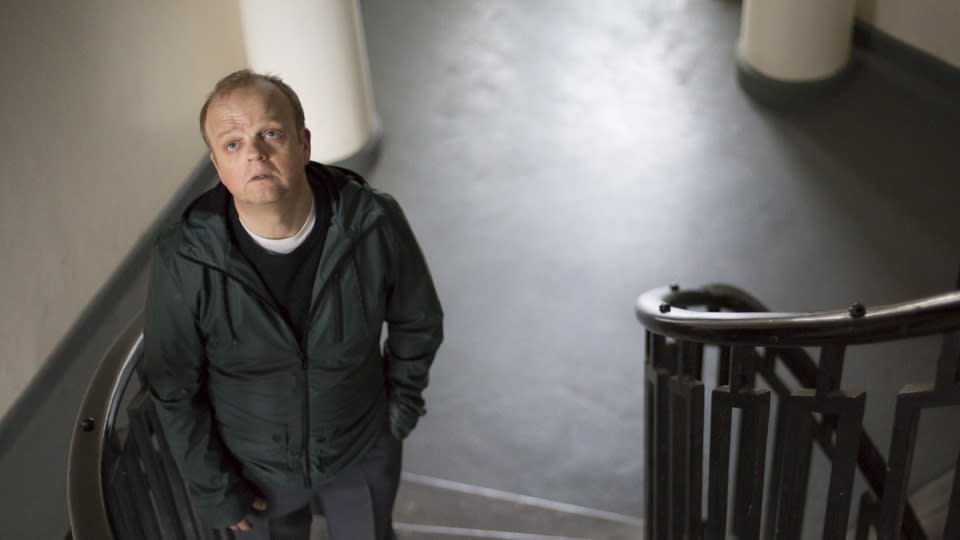Film Review: ‘Kaleidoscope’

The eponymous optical instrument gets a full symbolic workout in “Kaleidoscope,” an intricately crafted, infinitely wrongfooting psychological thriller in which conflicting realities coalesce, diverge and regroup like so many shifting formations of jewel-colored glass. A sharply styled debut feature for British writer-director Rupert Jones, this extended exercise in artful obfuscation feels the considerable benefit of a key family contact. Were it not for the ever-sympathetic, emotionally grounding presence of the helmer’s estimable older brother Toby in the lead — as a seemingly milquetoast ex-con entangled in an enigma-riddled case of murder — the film’s tricksy, collapsible is-it-or-isn’t-it structure would test the patience sooner. As it is, “Kaleidoscope” has the feel of a curt, clever short drawn out into a less complete calling card — some details catch the eye more than others, but we’ll surely be keeping the younger Jones’s number.
Though it’s set in a present day complete with with cellphone-dependent plot points, nearly everything else about “Kaleidoscope” seems painstakingly designed to evoke a late 1960s strain of semi-esoteric British cinema: from the sparse, glassy strains of Mike Prestwood Smith’s score, to the brutalist architecture of the east London council estate that houses the action, to the sagging, peeling mid-century modernism — in soiled shades of tea and ale — that dominates Adrian Smith’s fine production design. (Even the eye-wateringly patterned shirt our protagonist wears for a critical portion of proceedings has a faded sense of Swinging London to it.) But it’s the structure and tenor of the narrative itself, with its mix of circuitous repetition, elusive suggestion and hard culs-de-sac, that call to mind Joseph Losey in one of his more experimental moods — and in turn Peter Strickland, the contemporary British filmmaker most in thrall to that particular avant-garde phase. The presence of Toby Jones, as quietly panicked and eerily shambling here as in Strickland’s “Berberian Sound Studio,” underlines the comparison.
Meanwhile, it’s hard not to detect a wily dash of “Psycho” in Jones’s repeatedly splintered, refracted mystery, which begins with protagonist Carl, a solitary sadsack not long out of prison, waking in his dingy apartment to signs of a struggle he cannot recall, before discovering the murdered body of a young woman, Abby (Sinead Matthews, brashly endearing), in the bathroom. Or does he? From this grim introduction, Jones’ script spirals clockwise and anti-clockwise by turns, deliberately muddying the temporality of the film; when certain events happened, moreover, becomes a less crucial question than whether they happened at all. The story’s fixed pivot is an awkward, internet-engineered date between Carl and Abby, a gabby trickster with designs on his valuables, which goes from stilted to sinister with the over-addition of alcohol.
Yet even as he attempts — with nightmarish, ever-faltering inefficiency — to clean up the bloody fallout of this encounter, Carl is plagued by an even more damaging conflict with a woman: his domineering mother Aileen (Anne Reid), who turns up to visit the same day, and under whose passive-aggressive influence the faultlines of her son’s ruptured psychology are laid bare. Not so bare, of course, as to crystallize precisely what has happened in this toxic, claustrophobic apartment: Editor Tommy Boulding shuffles hints, suggestions and revelations like a skilled cardsharp, as we alternately consider the possibilities of Aileen being a cruelly timed foil to her son’s crimes, a nagging imaginary figment, a vengeful phantom or even an alternative manifestation of Carl’s young victim. Whatever the truth, as played with either crowish portent or plaintive need by the excellent Reid, she hangs over her son and his ellipse-filled struggle like human cigarette smoke, clouding his every thought until the scenario reshapes itself again, dealing him another luckless hand.
Darkly dainty as this ornate storytelling geometry is, however, it’s hard to remain heavily invested in the outcome through a runtime that, even at a modest 90-plus minutes, feels a tad stretched. The director and his team perform their repeated rug-pulls with panache, deftly concealing the truth in the manifold angular shadows of Philipp Blaubach’s lensing, but as the reality of Carl’s plight grows ever harder to determine — turning a whodunnit into more of a whodunwhat — not every viewer will care that much about seeing him through it all. It’s finally Toby Jones, more than Carl, who holds onto our hearts: The actor’s vulnerable air of crumpled, compromised decency warms and complicates passages of “Kaleidoscope” that might otherwise seem merely theoretical.
Related stories
IFC Midnight Takes U.S. Rights to Toby Jones Movie 'Kaleidoscope' (EXCLUSIVE)
Review: Coldplay's 'Kaleidoscope' EP
TV Review: 'Witness for the Prosecution' on Acorn TV
Subscribe to Variety Newsletters and Email Alerts!

